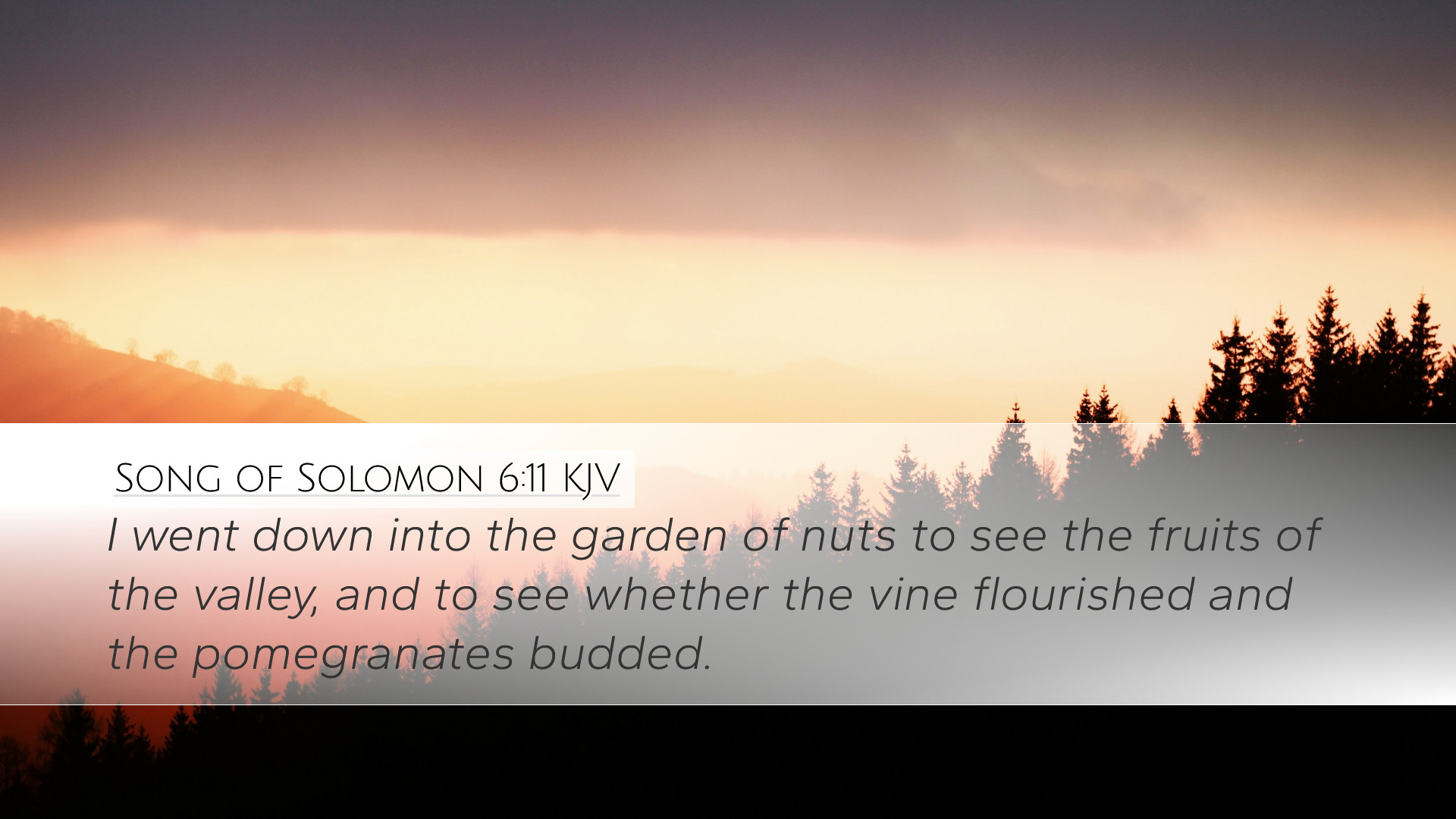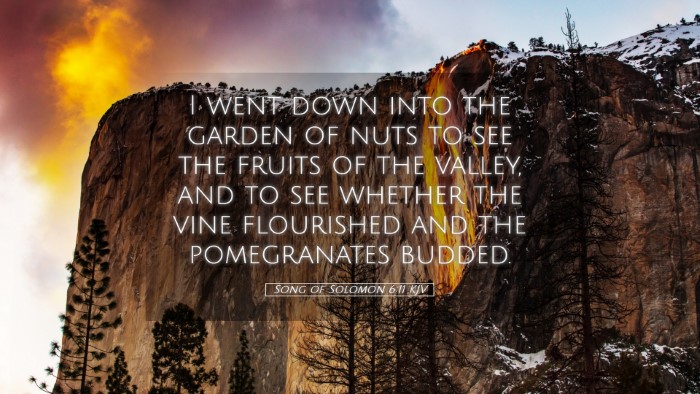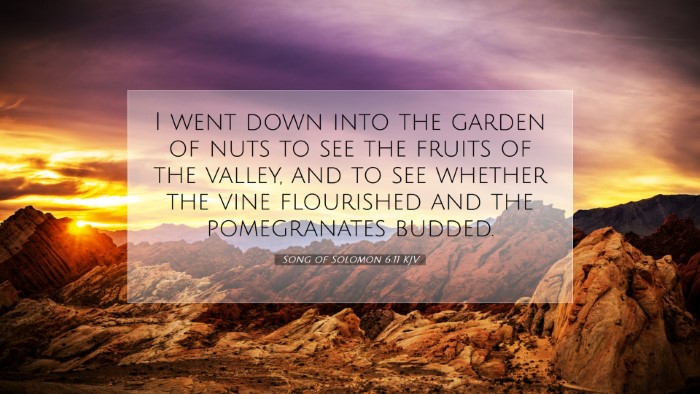Old Testament
Genesis Exodus Leviticus Numbers Deuteronomy Joshua Judges Ruth 1 Samuel 2 Samuel 1 Kings 2 Kings 1 Chronicles 2 Chronicles Ezra Nehemiah Esther Job Psalms Proverbs Ecclesiastes Song of Solomon Isaiah Jeremiah Lamentations Ezekiel Daniel Hosea Joel Amos Obadiah Jonah Micah Nahum Habakkuk Zephaniah Haggai Zechariah MalachiSong of Solomon 6:11
Song of Solomon 6:11 KJV
I went down into the garden of nuts to see the fruits of the valley, and to see whether the vine flourished and the pomegranates budded.
Song of Solomon 6:11 Bible Commentary
Commentary on Song of Solomon 6:11
Verse: "I went down into the garden of nuts to see the fruits of the valley, and to see whether the vine flourished, and the pomegranates budded."
Introduction
The Song of Solomon, attributed to King Solomon, is a poetic expression of love and desire between the bride and the bridegroom. It is filled with rich imagery and metaphor, conveying not only romantic love but also deeper spiritual truths. In Song of Solomon 6:11, the verse highlights a journey into a garden—an emblem of beauty, love, and fertility. This commentary seeks to unpack the meaning of this verse through insights from various public domain commentaries.
Contextual Analysis
In the preceding verses, there is a crescendo of affection and longing. The bridegroom calls his beloved to arise and come away, suggesting an intimate relationship characterized by mutual desire. As we delve into the verse, we discover how the imagery of a garden becomes a central focus.
Insights from Matthew Henry
Matthew Henry emphasizes the significance of the garden as a place of communion and exploration. He notes that gardens in Scripture often symbolize a place of beauty and nurturing. In this instance, the bride's venture into the "garden of nuts" reflects her quest for deeper intimacy and understanding of her partner's affections. He suggests that this journey is not merely physical but spiritual, as it involves the seeking of fruits that represent the outcomes of love—joy, fulfillment, and spiritual nourishment.
Symbolism of the Garden
- The garden is a metaphor for the church or the beloved community.
- The fruits signify the gifts and graces bestowed upon believers.
- The diligent search for "fruits of the valley" symbolizes the pursuit of spiritual maturity and bounty in one's life and faith.
Insights from Albert Barnes
Albert Barnes further explicates the horticultural references in this verse, linking them to the agricultural lifestyle prevalent during Solomon's time. He asserts that the mention of "nuts" and "pomegranates" carry cultural significance. Nuts symbolize sustenance and provision, while pomegranates are emblematic of fertility and abundance, often associated with the blessings of God.
Lessons from Exploration
Barnes describes the act of going "down into the garden" as a movement towards humility and understanding. In this context, the exploration signifies a desire to see whether the "vine flourished" and the "pomegranates budded," indicating a yearning to witness the results of love and commitment. This search illustrates the diligence required in relationships, both earthly and divine, stressing that one must actively engage and invest in the fruits of love.
Insights from Adam Clarke
Adam Clarke addresses the poetical nature of this verse, noting the allegorical interpretations it invites. He remarks that the passage can be seen as an allegory for the soul's exploration of spiritual truths within the richness of God's creation. According to Clarke, the "garden of nuts" represents a place where one can encounter fruitfulness and abundance that comes from the presence of the Divine.
Spiritual Reflections
- The "fruits of the valley" can symbolize the tangible results of a life lived in pursuit of God's glory.
- Pomegranates, as fruits, remind believers of the new life promised through the Holy Spirit.
- The act of "seeing" can denote the conscious awareness of God's work in one’s life and relationships.
Theological Implications
Combining the insights from these commentaries, we can extract profound theological implications. The verse encourages readers to seek a deeper relationship with God, akin to the bride’s journey in the garden. The exploration carries with it a sense of expectation—much like faith, where believers anticipate the manifestation of God's blessings.
Reflective Considerations
- What "gardens" are we called to explore in our spiritual lives?
- How can we cultivate the fruits of the Spirit within ourselves and our communities?
- In what ways might our "journeys" reflect our desires for deeper intimacy with Christ?
Conclusion
Song of Solomon 6:11 serves as a poignant reminder of the beauty of pursuing love—both earthly and divine. The reflections drawn from these public domain commentaries illuminate the rich symbolism embedded within this verse. It emphasizes the necessity of seeking, nurturing, and cultivating the various aspects of love that lead to spiritual fruition. For pastors, students, theologians, and Bible scholars, this verse invites ongoing discourse about the nature of love, commitment, and the very fabric of a believer's journey toward holiness.


